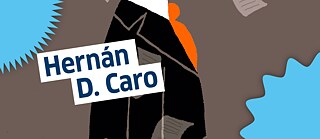Zeitgeister On Air Being Kafka #3 with Hernán D. Caro

Why is there so much love for Franz Kafka in Latin America? Soraya Sarhaddi Nelson interviews Hernán D. Caro to find out. Hernán is a Colombian author and editor. He lives in Berlin. One reason for Kafka’s popularity in Latin America, in his view, is that Kafka’s clear language can be translated into other languages like Spanish without much detriment. Furthermore, Hernán believes that Kafka has given other authors an incredibly great gift: by showing them how to write about the weirdest things as if they were more normal than anything else in the world.
Transcript
Soraya Sarhaddi Nelson: Welcome to Being Kafka, the second season of ZEITGEISTER ON AIR by Goethe-Institut and Common Ground Berlin. I’m your host, Soraya Sarhaddi Nelson. It’s been 100 years since the author Franz Kafka passed away. To honour his legacy and explore whether he is relevant to us today, we bring you this illuminating series with articles you can find at goethe.de/kafka. You will also learn more about Kafka and people he influenced in audio episodes like this one. And speaking of influence, my guest today will help us explore what influence the author had in an entire region, namely Latin America. He is author, editor and journalist Hernán D. Caro who was born in Bogotá, Colombia and has lived in Germany for more than two decades. I asked him about his relationship with Franz Kafka and his works.
Hernán D. Caro: Well, my relationship with Franz Kafka is first the relationship of a passionate reader. I don’t know when exactly I discovered his works, maybe when I was at school. But in the last months, because this year we’re going to celebrate 100 years of Kafka’s death, I began to read more about Kafka and I wrote some texts for the Goethe-Institut. One about the influence of Kafka in Latin America and another one about Kafka and humour. So I have the feeling in the last months I’ve read all Kafka again and thousands of things that I didn’t know. And so I’m now again very much into Kafka again.
Soraya Sarhaddi Nelson: When you say you first encountered him in school, would this be in school when you were younger in Bogotá? Like, do you remember if it was high school or if it was…?
Hernán D. Caro: It was high school, definitely. When I was 15 years old, I can remember we had this great teacher, a literature teacher, who gave us some project. We should read in different groups, different authors. And he gave me and my best friend – we were like some literary nerds at that time – he gave us an Argentinian author or the Argentinian author called Jorge Luis Borges to read because he thought maybe they’re going to like him. And then we had to make a presentation at the end of the semester or whatever. And we became obsessed with Borges, which is quite easy to explain because Borges creates huge worlds and he also was a very passionate reader who is always talking about, in his short stories or essays, about other authors. So I can very well imagine that I discovered Kafka through him, like I discovered Schopenhauer or Berkeley, like some philosophers. And Kafka is being the very famous author he is. At some point, if you’re young and you like to read books, you’re going to encounter Kafka.
Soraya Sarhaddi Nelson: Do you remember what your first reaction was? Because he writes very strange fiction compared to more classical authors you might read.
Hernán D. Caro: Oh yeah, definitely. Maybe my first impression, which I think it’s also my youngest impression. I mean, my youngest impression now, maybe I have this impression every time I read him – is what you said, he’s like a strange author. Sometimes there is something which is very much magnetizing about him. You have the feeling he’s calling you, but you don’t always understand exactly what’s happening in Kafka. And that’s, I think, a huge part of the fascination of Kafka. Even now, or especially now, where I’m not afraid of not understanding things. When I was younger, maybe you thought “Okay, there must be something here.” Now I have the feeling I don’t have to understand him and that’s also a kind of pleasure. So this fascination with strangeness and the beautiful language Kafka writes in, yeah.
Soraya Sarhaddi Nelson: Do you have a favourite among the books that he wrote?
Hernán D. Caro: Yeah, I think probably “Die Verwandlung,” “The Metamorphosis,” or actually it should be translated “The Transformation.”
Soraya Sarhaddi Nelson: You’re right. That would be a better word for it.
Hernán D. Caro: Yeah, I don’t know if Kafka was thinking the Greek word, but anyway, “The Transformation” or “The Metamorphosis” I think that’s maybe not only, of course, my book I like the most, but almost every Kafka reader would say “Die Verwandlung,” because it’s quite round, let’s say. Maybe it’s not easy, but it’s also not terribly difficult. It’s short. It’s very clear what’s happening – a guy wakes in the morning and he’s not a guy anymore, but a bug, a huge bug. And that’s already from the first sentence, like…you want to know more. And it doesn’t get better. And at the end – well, I’m not going to tell the end. But I think it’s one of his most powerful books. It’s funny. It’s strange. It’s dramatic. You know, it has everything, actually.
Soraya Sarhaddi Nelson: Did you read him in German or in Spanish?
Hernán D. Caro: I read him for the first time in Spanish, of course, when I was like very young, 15, 16, 17, something. And now, because my German…I think it’s almost my second first language, I read Kafka now in German. Yeah. But I’ve read him in English as well. There are beautiful translations. But of course, Kafka is for me now the German language.
Soraya Sarhaddi Nelson: And is it different? Was it different when you read it in Spanish versus when you read it in German?
Hernán D. Caro: Maybe not because of the language, I think. Kafka’s language is very precise, very clear, very pure. So I don’t have the feeling that it changes radically when you read him in Spanish or in English or in German. It’s my feeling, anyway. But of course, it changed because I had changed. And when I first read him, I was maybe more naive in a beautiful, young way. You know, everything is new for you. And when I read him the last time, I don’t know, two weeks ago, I’m older now, I’ve read more – so you don’t have that sense of surprise and astonishment. Or at least not the way you had it 30 years ago or something. So yeah, it has changed, but the languages are not, like, I think the most important thing in Kafka.
Soraya Sarhaddi Nelson: Does the essence of Kafka’s work translate easily into Spanish, Portuguese, and the many indigenous languages in South America? Or is there a language barrier to understanding Kafka?
Hernán D. Caro: I’ve never done it, but because I’ve written about Kafka in German. Now I only write in German. And I translated my own text from the German into Spanish, which is strange. But that’s what I do now. I think it’s actually not very difficult to translate Kafka, because he wrote…there is a German writer of the 20s and 30s called Kurt Tucholsky, whom I love very much. And he wrote about Kafka in the 20s when I think Kafka was still alive. And he says that Kafka’s language is clear, pure, severe. And Borges, this Argentinian author, calls him a classic author, because he writes about profound existential topics in a very clear language. He’s maybe the classic author of the 20th century. So what I want to say with this is that it’s not quite difficult to translate Kafka. It’s definitely not difficult, in my opinion, to translate him into Spanish. And I don’t really know if in the indigenous languages of Latin America, which are hundreds, if Kafka has been translated by – but I know that there are authors that have indigenous families or that come from an indigenous tradition, for example, in Mexico, who love Kafka. So maybe they read him in Spanish. But the interesting thing is that the topics about which Kafka writes definitely translate very well into other cultures.
Soraya Sarhaddi Nelson: Well, Franz Kafka never travelled to South America, but he definitely influenced the literary scene there from what I’ve read. Why is that?
Hernán D. Caro: Yeah, Kafka was a huge and is still a huge influence in Latin America. But I have first to say he’s a huge influence still in the whole world. I cannot imagine or maybe let’s say it this way – I’ve read about the significance of Kafka in the Arabic world, for some African literatures, of course, in Europe and in the English-speaking countries. So it’s maybe not strange. Maybe the question is not why is Kafka influential in Latin America, but why shouldn’t Kafka be influential in Latin America? Because first, I think the topics that Kafka writes about are very human. And what I want to say with that is I think most of them just are part of the human experience. Lots of texts by Kafka seem to be like the translation of dreams, maybe of nightmares also. And I think of nightmares, lots of us have or have had, like situations…you cannot go from one place to another, your legs are very heavy, places become smaller or bigger. Those are these classical archetypes Carl Jung talked about, the psychoanalyst, that we all experience in dreams. And I have the feeling Kafka translated lots of or lots of his texts are translations of dreams, that he had and lots of us also have in a similar way. His topics are universal, so they are also relevant for Latin America. And some particular topics like bureaucracy, totalitarianism, the feeling you don’t understand, the rules of institutions, for example, they are quite Latin American, but also German, of course. So it’s easy to see why Latin American people found Kafka fascinating. We know what he’s talking about.
Soraya Sarhaddi Nelson: In the recent past, the literary genre of magical realism was highly popular in Latin America, which of course was economically depressed and long exploited by Western countries. How did Kafka influence magical realism in South America, or did he?
Hernán D. Caro: Yeah, I think he definitely did. As you said, magical realism is – most Latin American authors would say – a thing of the past. We don’t talk about – nobody – talks about magical realism in Latin America anymore, Latin American literature is still being described from the outside, from the English-speaking world or in Europe. In Latin America, nobody talks now about magical realism. It’s not what’s happening now. In literature, it’s mostly realism, political literature, a great, beautiful horror and fantasy, or fantastic literature tradition. So that was the first I wanted to say. And the influence of Kafka for this magical realism tradition, you can see it in almost all authors important for that tradition. Gabriel García Márquez, the Colombian author and Nobel Prize winner, he actually writes in his autobiography that Kafka and “Die Verwandlung,” “The Metamorphosis,” changed completely his way of seeing literature. Gabriel García Márquez as a young man was mostly into poetry, and then he received from some friend a book, a little book, called “The Metamorphosis.” He began to read it, and he says in his autobiography, García Márquez, that he was impressed, fascinated by the way Kafka writes about strange things, supernatural things maybe, in a completely normal way, as if they were completely normal things – the way García Márquez’s grandmother told him things when he was a child. So there you can see this magical realism is very much about presenting strange, supernatural or magical events in the normal reality. So a reality, but certainly somebody drinks chocolate and begins to levitate. And first, for this tradition of magical realism, those weren’t strange things. Those are the things we’ve heard in our childhood from our grandmothers or oral tradition. Things we think actually happened. So Kafka comes and writes exactly in the way your grandmother told you about things happening in the world. So it’s normal that you find Kafka fascinating because it’s okay, this is possible. It’s possible to write about these things. So García Márquez was very much influenced by Kafka. And the people who influenced García Márquez, for example, Mexican authors, Juan Rulfo, the author of “Pedro Parámo,” also a story about ghosts – and those also were readers of Kafka. And then you have all the tradition of Latin American literature that doesn’t necessarily can be described as magical realism. But people who were writing at the same time, Juan José Arreola in Mexico, Jorge Luis Borges, Julio Cortázar also in Argentina, these were people that were very, very curious about what was happening in European literature – because I have the feeling that Latin American literature and lots of Latin American intellectuals are very cosmopolitan. They are really open about the world and they want to know what’s happening. So they find Kafka and Kafka shows you how to write about strange things in the most normal way. And that was very important for the tradition of magical realism and for fantastic literature today in Latin America.
Soraya Sarhaddi Nelson: Are there countries in Latin America where Kafka is especially popular?
Hernán D. Caro: Probably those are the bigger countries where there was a bigger editorial industry, like Mexico, Argentina. I always say those are like the, or where the two cultural poles for Latin America for lots of years. Then Colombia became more and more important. So definitely, at least the authors from Mexico, from Colombia and from Argentina, you can really find the influence of Kafka in the works. And I’m thinking about, like I said, Juan Rulfo in Mexico or Juan José Arreola in Mexico, a young writer and poet called Sandra Rosa, a woman whose…her book was published in 2023. And then you have maybe in Colombia, like I said, García Márquez, but other authors that were very important. And in the South and Argentina, again, you have Jorge Luis Borges, Adolfo Bioy Casares, Silvina Ocampo and Julio Cortázar. Those are like the big, fantastic writers or the big writers of fantastic literature in the South. And now you still have authors like Samanta Schweblin or Mariana Enríquez, where you can definitely see the influence of Kafka’s topics at least. But I have the feeling if you take any country, be it Peru or Guatemala or Venezuela, etc., you will definitely find also – or Chile, of course – you will find authors that were fascinated by Kafka, because he’s actually, he belongs to the world. And in that manner, I would also say he belongs to Latin America from North to South.
Soraya Sarhaddi Nelson: What about non-authors? I mean, I hate to say regular people because authors can be regular people as well. But is Kafka still relevant today in Latin America with the general population 100 years after his death?
Hernán D. Caro: That’s an interesting question. I think he is. I think Kafka is still very present in the minds of people who also…of people who haven’t read Kafka and are maybe not going to read him. And I think this is not something that only happens in Latin America. For example, most of the people in Germany haven’t read Kafka. Like, I mean Germans who can read in German, went to a school in German and in Germany. But they still know the name Kafka because Kafka, as you say in Spanish, “for the good and for the bad,” is now like a trademark, like other cultural icons, I don’t know, like Ché Guevara, etc., who have become just like, yeah, trademarks or an image. So lots of people who have never read a word by Kafka have seen his picture. You close your eyes and you see this picture of Kafka in his last months, very, very sick. We all know that picture. We all know, or lots of people know the word “kafkaesque.” That means everything and nothing, like nightmarish, strange, weird, obscure. And lots of people know that word. So Kafka is one of those figures that have transcended literature and now belong to general culture, which is great. But at the same time, it’s a pity because we all think we know something about Kafka, but we should read him first, maybe, before thinking that Kafka is this or that way. He’s the poet or the author of desperation, of existential anguish. He’s definitely more than that. So yeah, in Latin America, Kafka is also important with people that haven’t read him. But I would very much hope that more people read him and discover things that are there in Kafka and are not so popular.
Soraya Sarhaddi Nelson: Thank you, Hernán.
Hernán D. Caro: Thank you, Soraya.
Soraya Sarhaddi Nelson: That was author, editor and journalist Hernán D. Caro. And I’m Soraya Sarhaddi Nelson, the host of Common Ground Berlin. Thank you for listening to this interview in our Being Kafka series. Join us for the next episode when I speak with a Swiss-born artist whose life was turned upside down when she read “Metamorphosis.”
Host: ZEITGEISTER ON AIR is brought to you by the Goethe-Institut. Thanks to all of our friends and partners for making this series possible. [Music]

